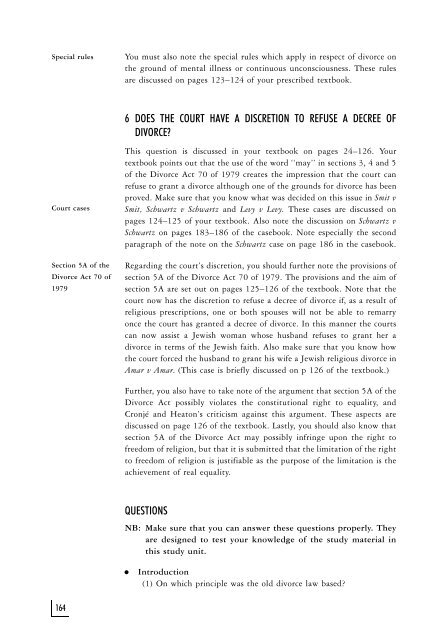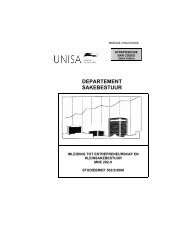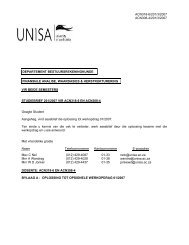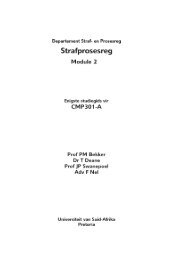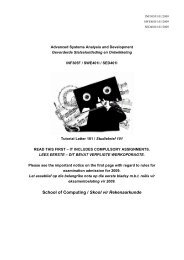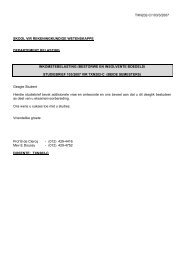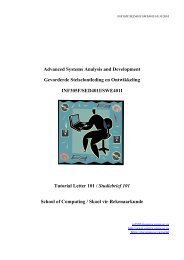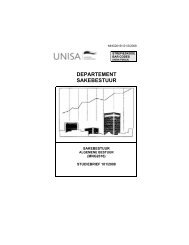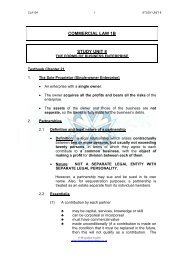key to the study guide - Name
key to the study guide - Name
key to the study guide - Name
You also want an ePaper? Increase the reach of your titles
YUMPU automatically turns print PDFs into web optimized ePapers that Google loves.
Special rules You must also note <strong>the</strong> special rules which apply in respect of divorce on<br />
<strong>the</strong> ground of mental illness or continuous unconsciousness. These rules<br />
are discussed on pages 123±124 of your prescribed textbook.<br />
Court cases<br />
Section 5A of <strong>the</strong><br />
Divorce Act 70 of<br />
1979<br />
164<br />
6 DOES THE COURT HAVE A DISCRETION TO REFUSE A DECREE OF<br />
DIVORCE?<br />
This question is discussed in your textbook on pages 24±126. Your<br />
textbook points out that <strong>the</strong> use of <strong>the</strong> word ``may'' in sections 3, 4 and 5<br />
of <strong>the</strong> Divorce Act 70 of 1979 creates <strong>the</strong> impression that <strong>the</strong> court can<br />
refuse <strong>to</strong> grant a divorce although one of <strong>the</strong> grounds for divorce has been<br />
proved. Make sure that you know what was decided on this issue in Smit v<br />
Smit, Schwartz v Schwartz and Levy v Levy. These cases are discussed on<br />
pages 124±125 of your textbook. Also note <strong>the</strong> discussion on Schwartz v<br />
Schwartz on pages 183±186 of <strong>the</strong> casebook. Note especially <strong>the</strong> second<br />
paragraph of <strong>the</strong> note on <strong>the</strong> Schwartz case on page 186 in <strong>the</strong> casebook.<br />
Regarding <strong>the</strong> court's discretion, you should fur<strong>the</strong>r note <strong>the</strong> provisions of<br />
section 5A of <strong>the</strong> Divorce Act 70 of 1979. The provisions and <strong>the</strong> aim of<br />
section 5A are set out on pages 125±126 of <strong>the</strong> textbook. Note that <strong>the</strong><br />
court now has <strong>the</strong> discretion <strong>to</strong> refuse a decree of divorce if, as a result of<br />
religious prescriptions, one or both spouses will not be able <strong>to</strong> remarry<br />
once <strong>the</strong> court has granted a decree of divorce. In this manner <strong>the</strong> courts<br />
can now assist a Jewish woman whose husband refuses <strong>to</strong> grant her a<br />
divorce in terms of <strong>the</strong> Jewish faith. Also make sure that you know how<br />
<strong>the</strong> court forced <strong>the</strong> husband <strong>to</strong> grant his wife a Jewish religious divorce in<br />
Amar v Amar. (This case is briefly discussed on p 126 of <strong>the</strong> textbook.)<br />
Fur<strong>the</strong>r, you also have <strong>to</strong> take note of <strong>the</strong> argument that section 5A of <strong>the</strong><br />
Divorce Act possibly violates <strong>the</strong> constitutional right <strong>to</strong> equality, and<br />
Cronje and Hea<strong>to</strong>n's criticism against this argument. These aspects are<br />
discussed on page 126 of <strong>the</strong> textbook. Lastly, you should also know that<br />
section 5A of <strong>the</strong> Divorce Act may possibly infringe upon <strong>the</strong> right <strong>to</strong><br />
freedom of religion, but that it is submitted that <strong>the</strong> limitation of <strong>the</strong> right<br />
<strong>to</strong> freedom of religion is justifiable as <strong>the</strong> purpose of <strong>the</strong> limitation is <strong>the</strong><br />
achievement of real equality.<br />
QUESTIONS<br />
NB: Make sure that you can answer <strong>the</strong>se questions properly. They<br />
are designed <strong>to</strong> test your knowledge of <strong>the</strong> <strong>study</strong> material in<br />
this <strong>study</strong> unit.<br />
. Introduction<br />
(1) On which principle was <strong>the</strong> old divorce law based?


